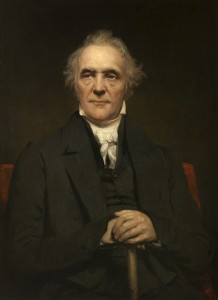 Earlier this week I read Iain Murray’s A Scottish Christian Heritage and found it full of stirring stories for the soul. Perhaps no chapter was as good for me as the one on Thomas Chalmers.
Earlier this week I read Iain Murray’s A Scottish Christian Heritage and found it full of stirring stories for the soul. Perhaps no chapter was as good for me as the one on Thomas Chalmers.
One quote in particular struck me with the force of a spiritual Hulk. Brothers of the pulpit, read this one s l o w l y:
How little must the presence of God be felt in that place, where the high functions of the pulpit are degraded into a stipulated exchange of entertainment, on the one side, and of admiration on the other! and surely it were a sight to make angels weep when a weak and vapouring mortal, surrounded by his fellow sinners, and hastening to the grave and the judgment along with them, finds it a dearer object to his bosom to regale his hearers by the exhibition of himself, than to do, in plain earnest, the work of his Master.
Now, off to your prayer closet to pray for humility, plainness, and earnestness as you preach this weekend. For God loves to reveal Himself through such preaching.
